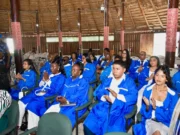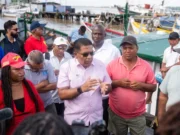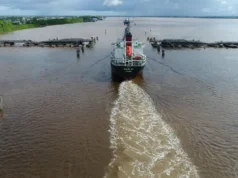Farmers from Essequibo Islands-West Demerara (Region Three) were on Tuesday told of the government’s plans to develop the root crops industry to satisfy demand within the region.
Specifically, Agriculture Minister Zulfikar Mustapha, who spearheaded an outreach to the islands of Bonasika, Wakenaam, and Leguan in the Essequibo River, informed farmers that interest in the said industry was raised following the Agri-Investment Forum and Expo. That event was held at the Arthur Chung Conference Center last May. Mustapha said bilateral discussions between local government officials and counterparts in CARICOM countries pointed to a ready market for a variety of root crops that can be grown in Guyana. He said these include turmeric, ginger, cassava, sweet potatoes, and eddoes.
In light of this interest, Mustapha said the ministry is ready to work with Essequibo farmers so that they can tap into the ready market, adding that it would be in keeping with CARICOM’s efforts to reduce the regional food import bill by 25% by the year 2025.
Research by Guyana Standard indicates that root and tuber crops such as arrowroot, cassava, dasheen, eddoe, ginger, sweet potato, tania and yam are farmed throughout the Caribbean and remain a staple of traditional diets. Belize, Guyana, Haiti, Jamaica, Suriname and some eastern Caribbean countries are self-sufficient in this sector with Jamaica and St. Vincent and the Grenadines leading regional exports.
With the capacity to create value-added products for local consumption and export, CARICOM has identified cassava, sweet potato and yam with the highest potential for development and export. These crops which are valued for their ‘good’ complex carbohydrates which provide better glycemic indices compared to imported refined carbohydrates are already grown here to the extent that local demand is completely satisfied.
To unlock the potential for export, regional leaders and stakeholders have underscored the need for political will and the provision of access to financing for farmers.
Additionally, Essequibo farmers were told that the ministry, through the National Drainage and Irrigation Authority (NDIA), would soon commence a series of drainage works on the respective islands. The minister told Bonasika farmers that a team from the ministry had visited the island sometime last month and based on their assessment, the proposed scope of works could not be completed this year.
“…The most important things you need, based on what is in the report, are proper drainage for your farms and to have the bushes cleared. The entire programme will cost about $120 million. We did not budget for those works this year but…we will put systems in place to start those works,” the minister explained.













